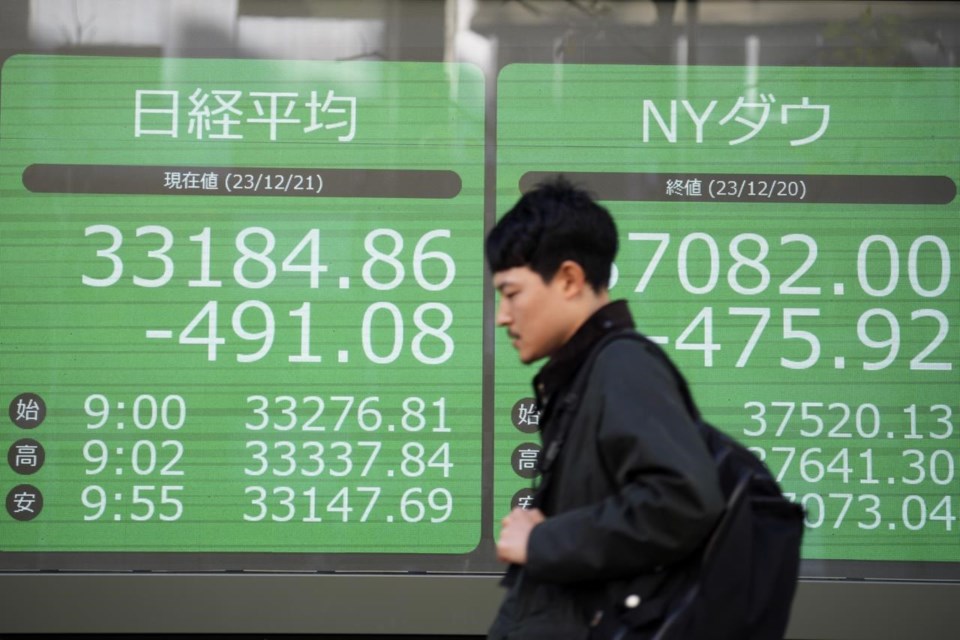Asian shares fell Thursday after Wall Street hit the brakes on its big rally following disappointing corporate profit reports and warnings that the market had surged too far, too fast.
U.S. futures rose while oil prices dipped as data showed an unexpected increase in U.S. inventories.
Tokyo’s Nikkei 225 index fell 1.6% to 33,140.47, with Japanese automaker Toyota leading losses on the benchmark, falling as much as 4%. The company said Wednesday it is recalling 1 million vehicles over a defect that could cause airbags not to deploy, increasing the risk of injury.
That came on top of news that Toyota small-car subsidiary Daihatsu had suspended shipments of all its vehicles in Japan and abroad after an investigation found improper safety testing involving 64 models, including some made for Toyota, Mazda and Subaru. Japanese transport ministry officials raided Daihatsu's offices on Thursday.
Australia’s S&P/ASX 200 slipped 0.5% to 7,504.10. South Korea’s Kospi shed 0.6% to 2,600.02. Hong Kong’s Hang Seng was flat at 16,617.87, while the Shanghai Composite added 0.6% to 2,918.71.
India’s Sensex was 0.2% higher and Bangkok’s SET gained 0.2%.
Wednesday’s losses on Wall Street were widespread, and roughly 95% of companies within the S&P 500 declined.
The S&P 500 slumped 1.5% to 4,698.35 for its worst loss since beginning a monster-sized rally shortly before Halloween. The Dow Jones Industrial Average dropped 1.3% to 37,082.00 from its record high, while the Nasdaq composite sank 1.5% to 14,777.94.
FedEx tumbled 12.1% for one of the market’s biggest losses after reporting weaker revenue and profit for the latest quarter than analysts expected. It also now expects its revenue for its full fiscal year to fall from year-earlier levels, rather than being roughly flat, because of pressures on demand.
The package delivery company pumps commerce around the world, and its signal for potentially weaker demand could dim the hope that’s fueled Wall Street’s recent rally: that the Federal Reserve can pull off a perfect landing for the economy by slowing it enough to stifle high inflation but not so much that it causes a recession.
Winnebago Industries' stock dropped 5.6% after it also fell short of analysts’ profit expectations for the latest quarter.
General Mills, which sells Progresso soup and Yoplait yogurt, reported stronger profit for the latest quarter than expected, but its revenue fell short as a recovery in its sales volume was slower than expected. Its stock fell 3.6%.
Still, a pair of reports showed the U.S. economy may be in stronger overall shape than expected. Both confidence among consumers in December and sales of previously occupied homes in November improved more than economists had expected.
Encouraging signs that inflation is cooling globally also continue to pile up. In the United Kingdom, inflation in November unexpectedly slowed to 3.9% from October’s 4.6% rate, reaching its lowest level since 2021.
Easing rises in prices are raising hopes that central banks around the world can pivot in 2024 from their campaigns to hike interest rates sharply, which were meant to get inflation under control. For the Federal Reserve in particular, the general expectation is for its main interest rate to fall by at least 1.50 percentage points in 2024 from its current range of 5.25% to 5.50%, which is its highest level in more than two decades.
Treasury yields have been tumbling since late October on such hopes, and they fell again following the U.K. inflation report.
The yield on the 10-year Treasury rose to 3.86% from 3.85% late Wednesday.
In other dealings, U.S. benchmark crude oil was down 8 cents at $74.14 per barrel in electronic trading on the New York Mercantile Exchange. Brent crude, the international standard, lost 7 cents to $79.63 per barrel.
The U.S. dollar fell to 143.15 Japanese yen from 143.56 yen. The euro rose to $1.0945 from $1.0943 late Wednesday.
The Associated Press


